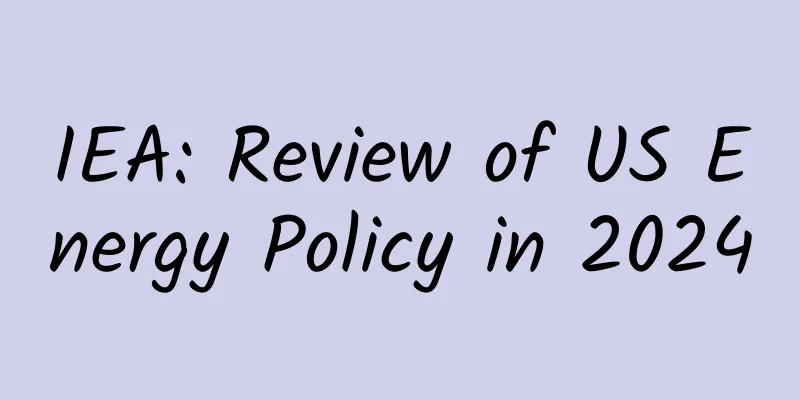IEA: Review of US Energy Policy in 2024

|
The IEA released the "2024 U.S. Energy Policy Review". The United States has implemented major energy and climate policy reforms aimed at putting the United States on a path to a clean, secure and affordable energy system and a net zero economy while promoting fair and high-quality employment. The United States is the world's second-largest energy consumer and CO2 emitter, but it is also a major technology and innovation leader, with rapid growth in clean energy investments making it the world's leading market for renewable energy, battery, electrolyzer and heat pump manufacturing, and electric vehicle sales. It is also the world's largest producer of biofuels. The United States is experiencing strong economic growth, accompanied by falling emissions and improving efficiency. Energy efficiency growth is expected to reach 4% by 2023. The IEA’s net-zero scenario and COP28’s commitment to increase global energy intensity progress from 2% to 4% have seen this effort every year for the past decade. The United States has driven major investments in renewable energy capacity, nuclear life extension, new nuclear, and low-carbon fuels. Domestic coal use has fallen to historic lows. Total U.S. CO2 emissions from energy combustion fell 4% in 2023, while the economy grew 2.5%. Two-thirds of the reduction came from the power sector. Strengthening energy security and clean manufacturing while reducing emissions Federal government actions are focused on expanding the clean energy economy and building diverse and resilient energy supply chains to strengthen energy security and clean manufacturing. Accelerate the industry’s transition to clean energy America’s energy transition depends on the development of new infrastructure across all sectors, and the federal government is pursuing a “private sector-led, government-supported approach” to achieve this goal. Implementing a people-centered energy transition Affordability, equity and quality jobs are at the heart of federal government policy. Managing energy security in transition Managing energy security during the transition requires governments to accelerate investment in clean energy supply and demand, making energy efficiency the first fuel.
|
<<: Does Huang Xiaoming’s Nut Projector P1 have the same looks as Angelababy?
>>: ZUK Z1 review: Has the goal of “Android version of iPhone” been achieved?
Recommend
E-commerce operation logic of 8 major platforms including WeChat, Weibo, and Bilibili
In recent years, the competitive and cooperative ...
The box manufacturer said that the ban will be rectified and will not affect the use of the box
Recently, the State Administration of Radio, Film...
Teach you step by step how to promote information flow videos!
Currently, the trend of online video advertising ...
Weiku 0 basics fun to learn SEO, detonate traffic, let customers actively come to your door to make money without doing anything
Han Shen's "Learn SEO with zero basic kn...
WeChat enters the deep waters of monetization: the focus this year may be advertising
As a tool for communication and social interactio...
30 high-quality cases of information flow advertising in 15 industries for your reference!
One month has passed in 2018. We often say: Once ...
Lineage OS 18.1 released: Based on Android 11, it has been adapted for more than 60 models
Lineage OS, a very popular third-party custom ROM...
How to turn new users into old users?
As online education enters the second half, refin...
The most complete car buying guide in history, help you avoid pitfalls and save money Baidu Cloud download
The most complete car buying guide in history, he...
A 63-year-old aunt suddenly started dancing and couldn't stop. It turned out to be caused by this common disease...
Expert in this article: Yang Chao, MD, attending ...
Don’t ask! Milk tea is drunk in the afternoon, people go crazy at night
Who is the most popular beverage in the beverage ...
The ancient zither is present in paintings from the Song and Yuan dynasties, and the taste of the zither is pure joy (Part 2)
The ancient zither is present in paintings from t...
Can eating onions, fungus, and drinking vinegar "soften blood vessels"? These cognitive misunderstandings need to be understood
We often hear people say that eating certain food...
How to find the reasons for decreased conversion by splitting “user active status”?
“Why has the conversion rate decreased? I can’t f...
Autolayout constraint animation (what a cute trick!)
Original article: Animating Autolayout Constraint...









